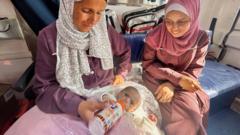Health organizations report severe impacts on life-saving programs worldwide as funding from U.S.A.I.D. is still inaccessible, leaving vulnerable populations at risk.
Health Aid Programs in Limbo: U.S. Assistance Stalled Amid Political Turmoil

Health Aid Programs in Limbo: U.S. Assistance Stalled Amid Political Turmoil
Despite a federal court ruling, critical global health initiatives remain paused due to the Trump administration's actions.
Funding for essential health programs around the globe is currently in a state of crisis, as the Trump administration continues to challenge a federal judge’s directive to halt the dismantling efforts of the United States Agency for International Development (U.S.A.I.D.). Ground reports from health workers in Africa and Asia reveal a troubling reality: families in Kenya are unable to obtain tuberculosis tests for their children, displaced individuals in Nigeria and Bangladesh lack access to clean drinking water, and therapeutic food programs meant to assist severely malnourished children in South Sudan cannot operate due to frozen resources.
Maleket Hailu, who oversees an organization supporting H.I.V. patients in Ethiopia’s Tigray region, expressed deep concern for those who previously depended on U.S.A.I.D. funding for medications. “People are traveling extensive distances—up to 300 kilometers—just to find treatments, as local sources have run out,” Hailu stated, highlighting the dire situation faced by many of the most vulnerable.
In response, a spokesperson from the State Department outlined that Secretary of State Marco Rubio’s office has issued over 180 waivers enabling some life-saving activities to recommence, with more approvals reportedly on the way. However, these waivers alone have not alleviated the freeze on crucial funding, as the payment infrastructure traditionally utilized by U.S.A.I.D. to distribute funds to various organizations has remained inoperative for an extended period.
This financial impasse has left numerous projects unable to function, despite their eligibility for waivers. Health and humanitarian entities typically rely on a responsive funding model that enables them to receive grants in swift increments as they submit requests for impending activities. With many groups operating on tight budgets and lacking alternative funding sources, the halted payments pose a significant threat to ongoing health initiatives, creating an urgent need for resolution to prevent further humanitarian fallout.
Maleket Hailu, who oversees an organization supporting H.I.V. patients in Ethiopia’s Tigray region, expressed deep concern for those who previously depended on U.S.A.I.D. funding for medications. “People are traveling extensive distances—up to 300 kilometers—just to find treatments, as local sources have run out,” Hailu stated, highlighting the dire situation faced by many of the most vulnerable.
In response, a spokesperson from the State Department outlined that Secretary of State Marco Rubio’s office has issued over 180 waivers enabling some life-saving activities to recommence, with more approvals reportedly on the way. However, these waivers alone have not alleviated the freeze on crucial funding, as the payment infrastructure traditionally utilized by U.S.A.I.D. to distribute funds to various organizations has remained inoperative for an extended period.
This financial impasse has left numerous projects unable to function, despite their eligibility for waivers. Health and humanitarian entities typically rely on a responsive funding model that enables them to receive grants in swift increments as they submit requests for impending activities. With many groups operating on tight budgets and lacking alternative funding sources, the halted payments pose a significant threat to ongoing health initiatives, creating an urgent need for resolution to prevent further humanitarian fallout.






















